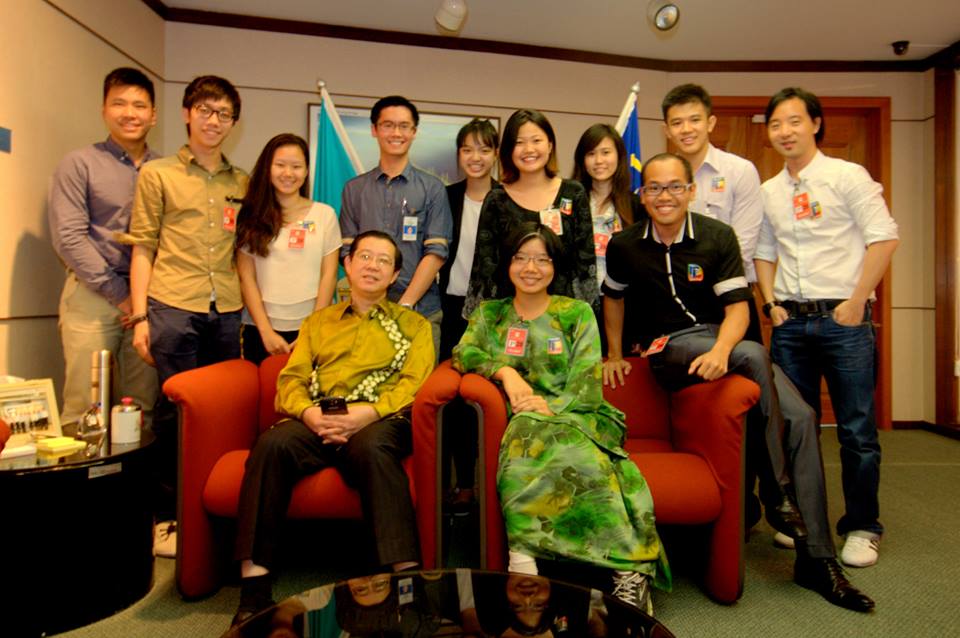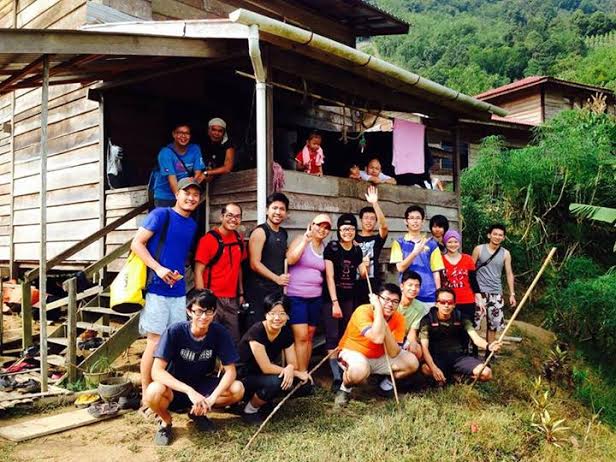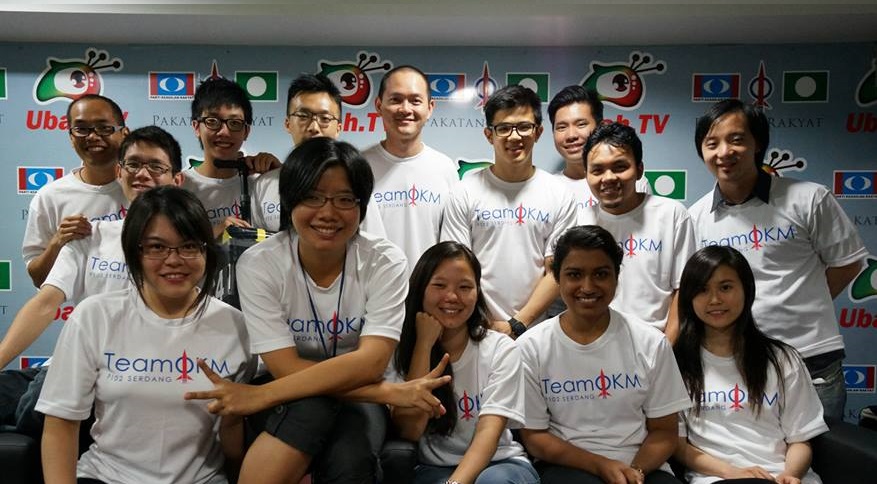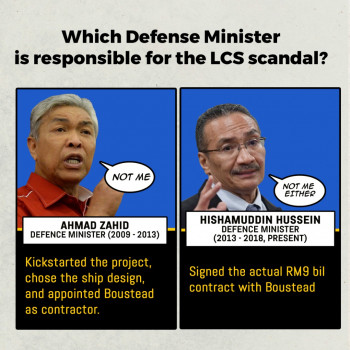By Sharon W.H. Ling (front row, second from left in the picture below), Parliamentary Researcher for Ong Kian Ming
It’s never a slow day at work.
It’s 8:30am on a gloomy Monday morning at the Democratic Action Party HQ in Pudu. I open my laptop and, one by one, 6 web browser tabs. Office email account. Second email account. Facebook Newsfeed. Facebook Page. Facebook Page messages. Twitter feed. (At least, on this job, being on social media is an actual part of work.) I glance through the stack of newspapers on the side. The Star. New Straits Times. Malay Mail. Berita Harian. Utusan. I scan the major news stories for the day, checking to see if my boss, or Serdang, is mentioned in any of them. My laptop beeps, loudly. There are emails waiting, already, with more to come – the usual litany of complaints about potholes, floods, land titles, traffic problems, and rubbish collection, all paling in comparison to the latest and loudest grumblings about no water in Balakong for a week.
My smartphone buzzes rapidly, agitatedly. It’s an ongoing Whatsapp conversation between my boss, our on-the-ground team in Serdang, and the ADUN of Balakong, Eddie Ng. The water crisis is growing with no end in sight. Some areas haven’t had water for 3 days, 5 days, 7 days. Residents are angry and restless, for good reason. Something needs to be done – and urgently.
My phone buzzes again. A decision’s been made. The team will drive around with the local MPKJ councilor from 5pm till after midnight, taman to taman, with borrowed water tankers. I confirm the schedule and places for water distribution and post the information on our Facebook Page. Residents respond swiftly – some cursing SYABAS, others pleading for water delivery to
their own tamans, some despairing, some temporarily relieved and thankful.
The clock ticks on. More emails. My boss is on a roll, firing off 3 press statements in the last 2 days. One on the broken School-Based Assessment system, one on the proposed Social Inclusion Act to tackle poverty and marginalization, and one on the resignation of P. Waythamoorthy, former Deputy Minister in the Prime Minister’s Department. The statements will need translation into Bahasa Melayu and Mandarin Chinese before I upload them on our website and Facebook Page. Another beep. A research request. My boss is chairing a roundtable on education reforms, and we need to present country case studies for discussion. We need information on autonomy and decentralization in Singaporean schools – how much freedom do they have to manage their own affairs, finances, teachers, students, and curriculum, and can this be done in Malaysia too? I make a note on my to-do list.
Then, an interruption – a Facebook message asking about welfare aid, from a young mother of 3 pre-schoolers struggling to make ends meet on a part-time office salary. This leads to an online conversation with Tony Pua and Wong Chen’s assistants, as we put our heads together to think. I type out a list, 2 pages long, with painstaking details of the welfare aid that the constituent and her family qualifies for, and suggest to her that she consult the Social Welfare Department. A pause – then a short ‘terima kasih’, accompanied by a smiley-face emoticon, appears onscreen. I silently wish her luck. Next, an event invitation – a Saturday morning briefing on homelessness and poverty, hosted by a social work NGO. I check my calendar – already half-full with notices and RSVPs for forums, meetings, briefings and sessions. I decide I have time, and click yes.
My phone alarm beeps – 5:30pm. I go home for a break. Later, at 8:00pm, I turn on the laptop, and begin drafting my presentation on school reforms in Singapore and Malaysia.
It is midnight when I sleep.
Next day, it begins again.
—
It is 6:00pm in Parliament on a Thursday evening.
Our GE13 campaign shirt was a dri-fit running tee colored with the party logo, with the words ‘TeamOKM’ splashed on the front and ‘In For The Long Run’ on the back. Seven months after GE13, the habit sticks. My boss is a half-marathoner with a firm stride that carries him through Parliament corridors, across ceramah stages, upstairs to service centre offices, into masjids and churches and pasars and community halls and kedais and homes. I’ve swapped dress heels for running shoes – it’s easier to keep up, in every way. My boss wears many hats – lawmaker, researcher, campaigner, fundraiser, mediator, negotiator, social worker, many more – and his team must do no less. If some days feel like short sprints, the weeks long runs, the next three or four years must be marathons – the speed consistent, pace purposeful, eyes always on the prize.
 And yet, seven months after GE13, there are as many valleys as there are hills. My phone and Facebook buzzes with geleng-kepala doom and despair. Karpal Singh’s conviction for sedition. Anwar Ibrahim’s conviction for sodomy. I glance through the hysterics and hand-wringing, the anger and agony. A friend asks what I think. My response is swift, light and glib, although my
And yet, seven months after GE13, there are as many valleys as there are hills. My phone and Facebook buzzes with geleng-kepala doom and despair. Karpal Singh’s conviction for sedition. Anwar Ibrahim’s conviction for sodomy. I glance through the hysterics and hand-wringing, the anger and agony. A friend asks what I think. My response is swift, light and glib, although my
heart is sinking: “Same [nonsense], different day.” I think back to our team’s research on the Budget 2013, and the Auditor-General Reports of 2012 and 2011 – nearly three weeks each of digging and tabulating numbers, estimating overspending and wastages, amounting to millions and billions. The end result: brief, terse headlines on online news sites, which disappeared in a digital flash almost as soon as they arrived. Drops, drops, drops into a bottomless bucket.
We drive home, and I turn to my boss. He’s had a productive day in Parliament – speaking up against the wrongful police arrests of Orang Asli in Gua Musang, Kelantan, defending Major Zaidi Ahmad against his court-martial for reporting problems with indelible ink in GE13, objecting to the School-Based Assessment system, and advocating the introduction of the Social
Inclusion Act. It was a long speech to a small audience of MPs; if we’re lucky, some members of the public will read the text on our website and Facebook Page and other news sites. And there’s the ongoing spat with the Minister of Urban Well-Being, who is backing the construction of an incinerator in Kepong. My boss has been firing off press statements since January, the result of painstaking hours of research, meetings with concerned citizen groups, and working visits to the incinerator site. The Minister’s latest response has been to derisively dismiss my boss, telling him to ‘go google safe Japanese incinerators’ – for which my boss has shot back a scalding reply.
“Did he answer you after you roasted him?” I ask. “No,” my boss says with a shake of the head.
I shrug. Live to fight another day.
Next week, it begins again.
—
It takes a particular and peculiar kind of patience to want to work in politics or public service, let alone for the Opposition in Malaysia. The pay is not extravagant, just enough. The hours are long, the future uncertain. Each new day brings opportunity as well as crisis. There are ups and downs, lows and highs, joys and sorrows, sweat and tears. There is a Spartan briskness and
leanness to our work, reflected in our shoestring resources and simple operations. “This is DAP, we have no spare laptops for you,” our office IT manager and general-go-to-guy jokes with my interns, the first day they show up without any equipment. If the work is unassuming, so are the rewards – a thank you from a constituent, a relief of a crisis averted, an issue raised and spoken for, a case fought and won, a new alliance forged, a moment of triumph, a quiet whisper in one’s mind, a mental pat on the back, that something at least has been done and done right.
 I think back to a casual conversation with our interns, on the essential qualities of leadership. “Commitment,” I offer. “Being there to see something through. Not just saying something, but doing and making sure that it gets done.” To hope for a better tomorrow is only human; perhaps, to commit to realizing that dream is something more. For some, it is a calling, a conviction. For my boss, a Christian, it is a higher power; for myself, a secularist, it is humanity. Persistence to see the methods in the madness and fixes where there are failures. To see the concerns of the masses as one’s own. To see politics and public service as a means, not an ends, by which truth and love and justice is done and dispensed. To connect conscience with action, being with doing, caring with serving, citizenship with participation – to ‘speak truth to power’, as the saying goes.
I think back to a casual conversation with our interns, on the essential qualities of leadership. “Commitment,” I offer. “Being there to see something through. Not just saying something, but doing and making sure that it gets done.” To hope for a better tomorrow is only human; perhaps, to commit to realizing that dream is something more. For some, it is a calling, a conviction. For my boss, a Christian, it is a higher power; for myself, a secularist, it is humanity. Persistence to see the methods in the madness and fixes where there are failures. To see the concerns of the masses as one’s own. To see politics and public service as a means, not an ends, by which truth and love and justice is done and dispensed. To connect conscience with action, being with doing, caring with serving, citizenship with participation – to ‘speak truth to power’, as the saying goes.
I think back to my days at work. A cog in a wheel, to be sure; but a wheel among many wheels, big and small, individual parts and pieces in a long-rusted machine, labeled ‘Democracy’, that slowly and creakily turns after decades of misuse and abuse. Maybe one day, with enough grease and practice, the machine will run a little smoother, make life a little easier for everyone. I think of the other cogs – thinkers, speakers, writers, carers, doers, young and old, the ordinary men and women of conscience whom I know – who are, in their own means and ways, working to get that machine up and running. I think of choices made, and decide that I would do this all over given the chance. That there has been – and will be – no better time than now. To be a part of all this.
Tomorrow, it begins.
Again.





GREAT JOB GUYS AND GALS!
WE, FELLOW MALAYSIAN’S ARE WATCHING, WAITING AND YEARNING TO TASTE THE FRUITS OF OUR LABOUR, ESPECIALLY YOURS!
KEEP UP THE GOOD WORK!!!